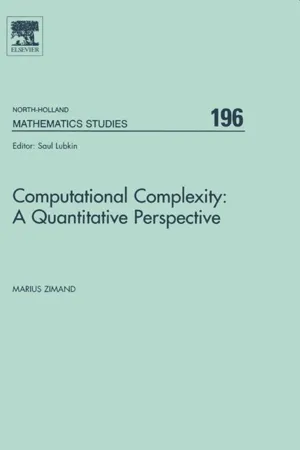
- 352 pages
- English
- ePUB (mobile friendly)
- Available on iOS & Android
eBook - ePub
Computational Complexity: A Quantitative Perspective
About this book
There has been a common perception that computational complexity is a theory of "bad news" because its most typical results assert that various real-world and innocent-looking tasks are infeasible. In fact, "bad news" is a relative term, and, indeed, in some situations (e.g., in cryptography), we want an adversary to not be able to perform a certain task. However, a "bad news" result does not automatically become useful in such a scenario. For this to happen, its hardness features have to be quantitatively evaluated and shown to manifest extensively.The book undertakes a quantitative analysis of some of the major results in complexity that regard either classes of problems or individual concrete problems. The size of some important classes are studied using resource-bounded topological and measure-theoretical tools. In the case of individual problems, the book studies relevant quantitative attributes such as approximation properties or the number of hard inputs at each length.One chapter is dedicated to abstract complexity theory, an older field which, however, deserves attention because it lays out the foundations of complexity. The other chapters, on the other hand, focus on recent and important developments in complexity. The book presents in a fairly detailed manner concepts that have been at the centre of the main research lines in complexity in the last decade or so, such as: average-complexity, quantum computation, hardness amplification, resource-bounded measure, the relation between one-way functions and pseudo-random generators, the relation between hard predicates and pseudo-random generators, extractors, derandomization of bounded-error probabilistic algorithms, probabilistically checkable proofs, non-approximability of optimization problems, and others.The book should appeal to graduate computer science students, and to researchers who have an interest in computer science theory and need a good understanding of computational complexity, e.g., researchers in algorithms, AI, logic, and other disciplines.·Emphasis is on relevant quantitative attributes of important results in complexity.·Coverage is self-contained and accessible to a wide audience.·Large range of important topics including: derandomization techniques, non-approximability of optimization problems, average-case complexity, quantum computation, one-way functions and pseudo-random generators, resource-bounded measure and topology.
Tools to learn more effectively

Saving Books

Keyword Search

Annotating Text

Listen to it instead
Information
Table of contents
- Cover image
- Title page
- Table of Contents
- Copyright page
- Dedication
- Preface
- Chapter 1: Preliminaries
- Chapter 2: Abstract complexity theory
- Chapter 3: Polynomial time, nondeterministic polynomial time, and exponential time
- Chapter 4: Quantum computation
- Chapter 5: One-way functions and pseudo-random generators
- Chapter 6: Optimization problems
- Appendix A: Tail bounds
- Bibliography
- Index
Frequently asked questions
Yes, you can cancel anytime from the Subscription tab in your account settings on the Perlego website. Your subscription will stay active until the end of your current billing period. Learn how to cancel your subscription
No, books cannot be downloaded as external files, such as PDFs, for use outside of Perlego. However, you can download books within the Perlego app for offline reading on mobile or tablet. Learn how to download books offline
Perlego offers two plans: Essential and Complete
- Essential is ideal for learners and professionals who enjoy exploring a wide range of subjects. Access the Essential Library with 800,000+ trusted titles and best-sellers across business, personal growth, and the humanities. Includes unlimited reading time and Standard Read Aloud voice.
- Complete: Perfect for advanced learners and researchers needing full, unrestricted access. Unlock 1.4M+ books across hundreds of subjects, including academic and specialized titles. The Complete Plan also includes advanced features like Premium Read Aloud and Research Assistant.
We are an online textbook subscription service, where you can get access to an entire online library for less than the price of a single book per month. With over 1 million books across 990+ topics, we’ve got you covered! Learn about our mission
Look out for the read-aloud symbol on your next book to see if you can listen to it. The read-aloud tool reads text aloud for you, highlighting the text as it is being read. You can pause it, speed it up and slow it down. Learn more about Read Aloud
Yes! You can use the Perlego app on both iOS and Android devices to read anytime, anywhere — even offline. Perfect for commutes or when you’re on the go.
Please note we cannot support devices running on iOS 13 and Android 7 or earlier. Learn more about using the app
Please note we cannot support devices running on iOS 13 and Android 7 or earlier. Learn more about using the app
Yes, you can access Computational Complexity: A Quantitative Perspective by Marius Zimand in PDF and/or ePUB format, as well as other popular books in Computer Science & Computer Science General. We have over one million books available in our catalogue for you to explore.